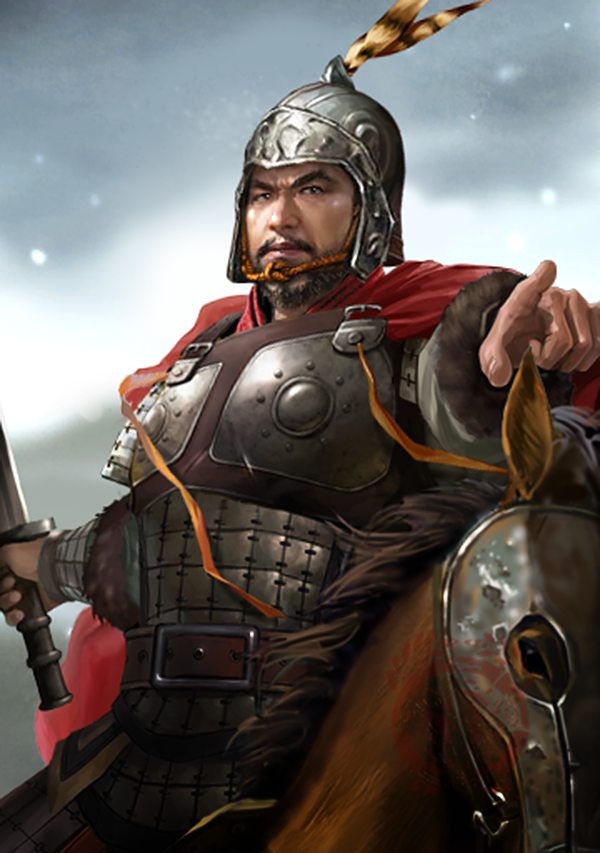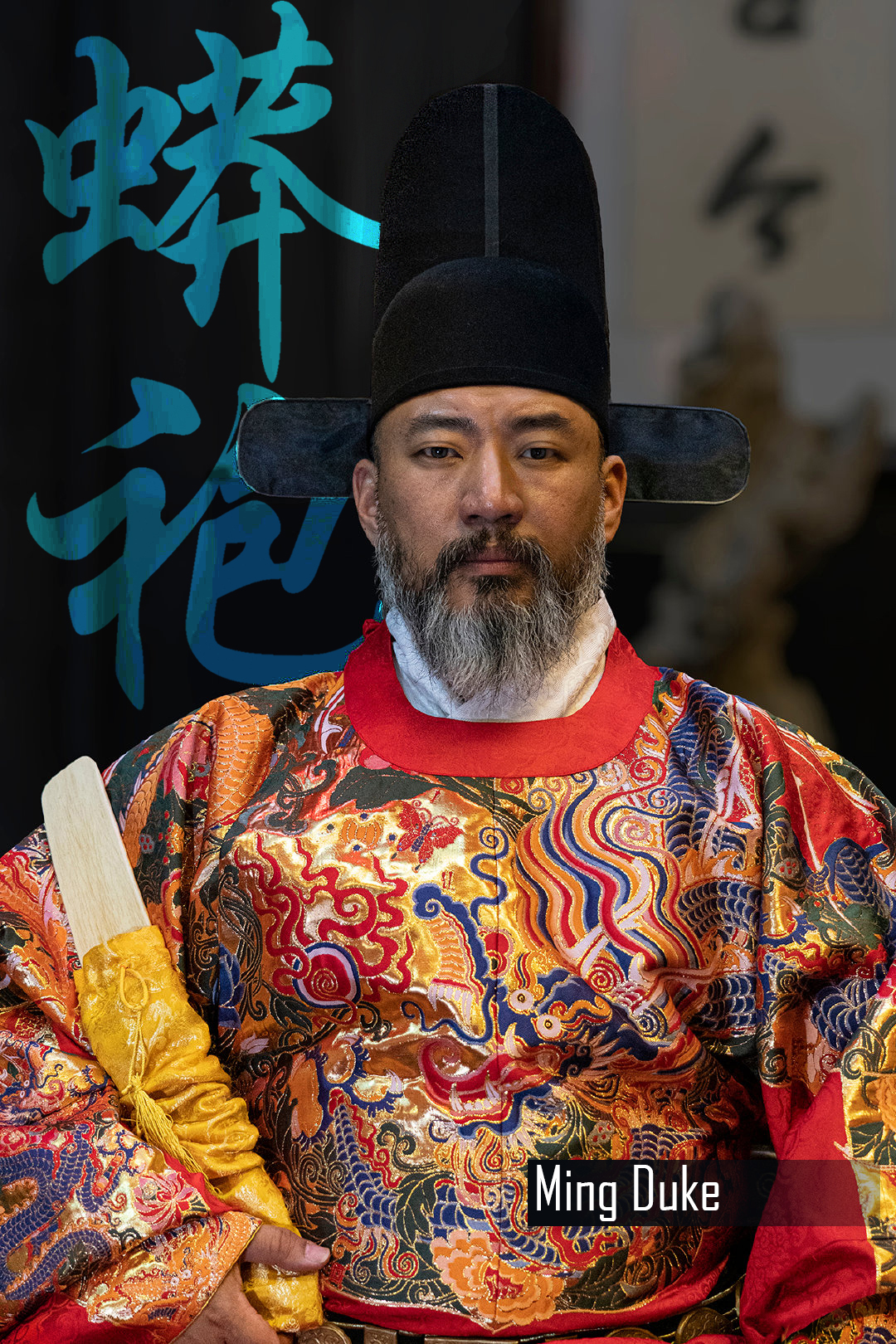Xi Shi's beauty was said to be so extreme that while leaning over a balcony to look at the fish in the pond, the fish would be so dazzled that they forgot to swim and sank below the surface. She was likely an amalgamation of several legendary unnamed beauties of the era trained and sent by Yue to undermine Wu.
Fuchai spent day and night with her and several other dozens of great Yue beauties. To please them, he even constructed an isolated and scenic palace lodge on the exquisite Lingyan Mountain in Suzhou. Lingyan Mountain itself has always been known for its delicate scenery, and the entire scenic mountain resembled that of a Bonsai miniature- their veritable snow globe separated from the Wu court and the rest of Wu's worries. Beside Fuchai, exorbitant bribes were simultaneously also paid to Bo Pi's estates, and he was made to continuously only speak positively on Yue's behalf to his king.
SATIATING ALL OF FUCHAI'S NEEDS
During this time, Yue drilled its soldiers constantly and passed many critical reforms that strengthened its army. Yue also began to stockpile for a confrontation
When the megalomaniacal Fuchai- so eager to outdo his father in deeds and achievements began to build a massive wooden palace on Tiger Hill (near where his father was buried) he faced a shortage of hardwood to fulfill his ambitious architectural dreams. When Goujian was made aware of this he immediately sent a generous bonanza of exquisite timber to Fuchai. This pleased Fuchai greatly.

In 486 BC when Fuchai initiated a massive canal building projects northward as a permanent riverine invasion highway to Qi ran into supply shortages (Fuchai had intended to allow a massive fleet to sail right beside Qi's borders with a constant supply of men and grain) Yue provided all that Fuchai needed to keep his attention northward. The ploy served 2 aims, not only was Fuchai's attention directed northward, but it also kept the Wu populace exhausted and busy with construction, thus unable to reap much in harvests (or likely stockpile enough in the heartland's granaries, since much of the grain will be requisitioned for Fuchai's campaigns.) Because of these ironclad supply lines, Wu decisively defeated Qi army in the battle of Battle of Ailing. Despite the clever guile of Yue, none of their ploys were missed by the sagacious Wu Zixu.
EXIT WU ZIXU
All of Yue's ploys were not lost on Wu Zixu, who- whenever he was made aware of Yue's maneuvers instantly raised a fuss to his sovereign, much to Fuchai's annoyance. Conversely, every time Wu would make such accusations, his claims would be disputed by the corrupt Bo Pi. Unlike with Fuchai's father- who formed a dynamic duo with Wu Zixu, Fuchai himself and Wu Zixu never had the same level of rapport, and by extension, the same level of trust between sovereign and his right hand. With the monarch's esteem placed solely on one who was directly benefiting from a parasitical conspiracy with Yue, Wu Zixu was shut off these key levers of power despite the enormous esteem he held with many Wu ministers. Though Wu tried to dispel Yue's influence with Fuchai and argued many times that Yue should be vanquished and Goujian slain, all of his entreaties were unheeded or bluntly rebuffed.

Wu Zixu, who was never convinced of the sincerity of Goujian's submission, always kept his eyes on the petty monarch to his south. The fact that Goujian was both able to be suicidally ruthless and kill 1 Wu king then a totally soulless obedient husk to another Wu king and have the 2 duplicitous aspects in one meant Goujian was capable of being both when the time needed.
Wu should not turn its attention elsewhere while such a latent power remain unchecked, especially when it seemed the whole of Wu's court was suspiciously rigged in their favor and toward turning its attention north. But for Fuchai- who only focused on appearance's, it was illogical that he should turn his blade against a slavish henchman who was totally willing to fulfil his every need. So long as his wishes were being fulfilled, to Fuchai, Goujian as king was the same slave Goujian he (thought he) knew.
Wu Zixu's streak of ruthlessness was not unwarranted. He fled to Wu many decades ago in his youth because his father was framed by the King of Chu and his clan was unjustly purged on trumped up charges. Homeless, Wu Zixu came to Wu and became one of its eternally steadfast pillars. His reforms with King Helü eventually propelled Wu to its astonishing heights as the Hegemon of the age. It was very likely that Wu Zixu did not trust Goujian because he personally knew how the embers of deep grudges and wrongs cannot be truly dispelled, despite whatever appearances.
By 484 BC, in one of Wu Zixu's frequent altercations with his King about invading Yue Fuchai was so annoyed and enraged that he gave Wu Zixu a sword and ordered him to commit kill himself, saying his constant obstructive behavior amounted to sabotage. This Wu Zixu dutifully obeyed, and took the sword (as was the custom of this age) to his throat. Before Wu Zixu committed suicide, Wu Zixu asked King Fuchai to remove his eyes after his death and hang them on the city gate so that he could watch the capture of the Wu capital by the Yue army. Thus died the pillar of Wu, who had been so inseparable from its soar.



A folk tradition maintained that after his death, Wu Zixu was denied a burial and thrown into the river. Another stated that before he slew himself, he gave a cryptic advice that if~ some how that the capital would ever be under siege, that the defenders would do well to "dig near the base of the capital's might walls." The meaning of these words would only be revealed in the next phase of our tale, when the capital was indeed put to siege, by none other than the one that Wu Zixu spent all of his last days warning of.
GOUJIAN READIES HIS STATE
In all of the 10 years since Goujian's return, he had never relaxed the drilling of his army. With the greatest pillar within Wu removed, the path of Yue's revenge laid open. Ironically as the coiner of Yue's greatest rival army had personally penned in the "Art of War": Yue had made its intentions impenetrable as night, and, soon, would fall like a thunderbolt.
BRAVE SWORDS

The army that Goujian readied was a reinvigorated one. In the "Record of Wu and Yue of Spring and Autumn" written in the Eastern Han period, it stated that an extremely talented swordswoman appeared in the Yue court- Yuenü 越女 (literally: "Maiden of Yue") that having demonstrated her peerless skill with her blade in front of the king, Goujian appointed her to train his army officers, who in turn, instructed his army.
As described by Sima Qian in the "Record of the Grand Historian" -"(After) Ten years of reforms; the (Yue) state was rich, the warriors well-rewarded. The soldiers charge in the face of arrows were like thirsty men heading for drink."
As an aside, it should also be noted that Wu's old enemy, Chu- which had been badly bloodied by Wu decades ago and had its capital looted was also keen to support Yue against Wu and offered much aid.
CASE OF THE BURROWED GRAIN
Immediately after Wu Zixu's death, in 483BC when Goujian was notified that Fuchai was preparing a great summit to cow the many states to the north, Goujian knew his time had come. Wu's preparations were extensive, and it would be part of Fuchai's bid to be recognized as Hegemon. Fuchai had hoped that in impressing many of the vacillating states with his massive marching army, he would be officially recognized by the influential states of the Central Plains, specially Jin- and be acknowledged as the overlord of the realm.


The preparations were exhaustive and Fuchai's guards and entourage composed of both naval and land columns. Before Fuchai departed, Goujian sent missives to Fuchai complaining of a great famine that had hit Yue lands and pleaded that Yue require aid in grain relief. However, as a good show of assurance from Yue. Yue would pay back the allotted grain amount in full at a later time once the famine had been averted. This Fuchai agreed. With this done, Wu marched north in a gambit for Hegemony. And in due time, the repayment grain from Yue began to arrive back in a slow trickle.
ARISE VENGEANCE
Fuchai's northern expedition began favorably, his massive army allowed him to arrogantly cow many of the smaller states to the north in line- including an episode where he rudely misbehaved in Confucius' Lu court and disrespecting its sacred rituals. During the great conference that year in 482BC, Fuchai's visible strength successfully challenged the Duke of Jin (the other powerful great lord of the realm) for the status of Hegemon at Huangchi.
FALL LIKE A THUNDERBOLT
It was precisely at this time that Goujian invaded Wu with a mighty army into what was a mostly defenseless Wu. It was extremely unfortunate for Wu that not only is its capital situated very close to Yue but also that the metropolis was largely defended by lower quality troops. Worse yet, that the enemy pinning them was someone who knew well of the city in his 3 years here as a slave.
All of the Wu garrisons encountered by Goujian's army were destroyed and their great misfortune were exacerbated by the fact that a famine broke out across the Wu heartlands. It had turned out that the grain which was returned by Yue had all been boiled. So that once the grain seeds were planted nothing would grow. The onset of famine, repeated military defeats compounded the situation and brought Wu to its knees in only months.
When Fuchai- who was still in attendance during the lordly summit was informed that most of the Wu garrisons had been defeated and that Goujian had captured and executed Fuchai's heir Crown Prince You, the embarrassed Fuchai hastily raced back with his army to a Wu that was on the verge of collapse. The Wu home army was no more and many pocket of Wu was too deep in a famine to render any supplies to its returning expeditionary army. With nothing to throw against Yue, Fuchai (again under the persuasion of the corrupt Bo Pi) hastily concluded an unfavorable treaty- ceding much of Wu's lands to the south and east to Yue control. Retaining only the heartland near the great walled Wu capital at Suzhou where it could be resupplied from water as well as hold off for a very long siege.
WU VANQUISHED
Yue's decision to not take Wu in one fell swoop owed to the fact that despite Yue's strength, it was still not in a position to besiege the metropolis/ capital at Suzhou and simultaneously commit to full battle with Wu's still formidable army in the field. Although the first foray had constituted more akin to a deep strategic raid, where vital garrisons, resource sectors, and even the Wu royal family tree were destroyed. Goujian opted to be patient in the long arc of his revenge against Wu.
For many centuries, oral traditions in Suzhou stated that during the starving siege inflicted by Yue upon the doomed city of Suzhou, that one of Wu Zixu's friends remembered the old minister's cryptic words to dig around the base of the walls. It had turned out that the fillings between large block of stone were actually made from pounded sticky rice gel: an admixture that was so sticky that it both retains its freshness while also keeping the strongest materials tethered together. It was also totally and ideally edible for a starving population.
Thus Wu Zixu saved his adopted people and the city he built and loved even long after his death. For thousands of years after this fabled age, in honor of Wu Zixu, rice cakes were eaten every year during the annual Dragon Boat Festival, and rice cakes wrapped in bamboo leaves were often thrown into the rivers to honor Wu's wronged spirit.
For 10 years, the rump state of Wu languished, with Fuchai's crown prince's status passed to another son. However, Wu was unable to muster enough to stand up to Yue again. Yue would harass then annex Wu piecemeal. As Goujian had anticipated, Wu was so damaged that it would never rise again to its former state. Goujian's army reappeared again outside of Wu capital later in 473 BC, this time with the aim of vanquishing the Wu state. Again the Wu field armies near the heartland were all blown away by the Yue army. This time the prepared Yue army dug in and surrounded the Wu capital for a proper siege.

A long siege thus commenced, but despite the long resistance by the Wu citizens, the long arc of the outcome was already decided. Yue surrounded both the capital and Fuchai himself on all sides, and all of the countryside were in Yue's hands. There would be no reinforcements, nor reinforcing supplies coming from any direction and any prolonging of the agony would only delay the inevitable. Fuchai asked for terms but Goujian's key minister Fan Li's steeled Goujian's resolve against any clemency. In the end, Fuchai- not wishing to be captured nor made into Goujian's slave, commit suicide with his sword and the kingdom of Wu- which had stood for centuries and only recently reigned as the brilliant Hegemon of the realm was annexed by Yue. Fuchai's other princes would forever renounce their claim to Wu and leave in exile, mournfully changing their last names simply to "Wu."
ARISE THE LAST HEGEMON
In Xuzhou, modern Shandong, Goujian assembled the regional lords and declared himself Hegemon of the realms.
According to the "Record of the Grand Historian" before Fuchai slew himself he had lamented that he did not heed the counsel of Wu Zixu and covered his face as he died because he dared not face Wu in the afterlife. The Record- which was written in Western Han dynasty in the 2nd century BC also stated that upon Goujian's entrance into the surrendered Suzhou he had the corrupt Wu minister Bo Pi executed, ironically for taking bribes and consorting with a foreign ruler. This was done because Goujian could never trust having such a traitor under his roof. However, the contemporary Spring and Autumn era Zuo Zhuan- directly disputed this, and recorded that in 471 BC Bo Pi was promoted. The once backwater of Yue had now tripled in size by incorporating most of what was Wu. Wu was no more and all of what was China's east coat belonged to Goujian.
Thus, in 473BC with his power indisputably asserted, Goujian became the last of the Five Hegemons of the Spring and Autumn era. Goujian would move his capital to the opulent Suzhou. After splitting up Wu with its new neighbor Chu, Goujian would spend the rest of his life consolidating his gains along the east coast of China.
THE PRECIPICE OF AN AGE OF CALAMITY: WARRING STATES
Despite other great powers of the era offering him recognition for his status as the greatest among them, the rest of Goujian's reign was riddled with disquietude and paranoia. A warrior king by nature, the gnawing anxiety at court eventually led Goujian to persecute his ministers. During his late life he ordered one of his key ministers, the capable Wen Zhong to commit suicide. While Fan Li, knowing that Goujian was a man who can share woes but not wealth together, left Goujian after the defeat of Wu and disappeared from history. Tradition has it that Fan Li fell in love with Xi Shi and the two of them eloped together on a fishing boat, freely roaming the misty wilderness of Lake Tai in the style of the Taoist immortals 仙. It is well and good that one of the important characters was able to leave the stage in what perhaps was a truly happy ending. Because for many, for the many million within the realm the last days of this age would herald a monstrous new one, one of endless wars and injustices.

It was with the ascension of Goujian- the 5th and last of the Hegemons of the Spring and Autumn era, the death of Confucius, and the Partition of Jin in 3 that many historians would agree this poetic age ended. With Goujian's death also went some of this age's most brilliant minds, including that of Laozi, Confucius, and Sun Tzu (only a while ago.) Blowing away with these lofty sages and romantic kings were the last veneers of what could be ascribed as... civility in what had already been an age of constant strife. But little did these men all know, the age that would follow was one singularly distinguished by ruthlessness: An age of endless wars between the greatest warlords of the realm that have all crowned themselves as kings. In the next age, where the last pretenses were dropped: all were Hegemons in their respective spheres. As the famous poem by William Butler Yeats stated:
Turning and turning in the widening gyre
The falcon cannot hear the falconer;
Things fall apart; the centre cannot hold;
Mere anarchy is loosed upon the world,
The blood-dimmed tide is loosed, and everywhere
The ceremony of innocence is drowned;
The best lack all conviction, while the worst
Are full of passionate intensity.
The Warring States period would be an evil crucible where so much of the best and brightest of humanity, and all that had flourished, that were lovingly written in this age would twist down the gyring whirlpool of destruction and die. Rest assured, all of those who consecrated their worth in survival during the next age, even the best were monsters.

 After Fuchai withdrew his men from Yue, Goujian took his wife and the minister Fan Li to the Wu court to serve his opponent. A traditional legend has that before Goujian crossed the border into Wu, he disrobed from his regalia and in turn took the clothing befitting that of a servant/ slave. Before crossing into Wu, a despondent old man grabbed 2 palms of earth and asked to brush them over Goujian's cheeks. Goujian accepted the 2 palmful of earth which was rubbed over his face so that he would never forget the homeland of Yue.
After Fuchai withdrew his men from Yue, Goujian took his wife and the minister Fan Li to the Wu court to serve his opponent. A traditional legend has that before Goujian crossed the border into Wu, he disrobed from his regalia and in turn took the clothing befitting that of a servant/ slave. Before crossing into Wu, a despondent old man grabbed 2 palms of earth and asked to brush them over Goujian's cheeks. Goujian accepted the 2 palmful of earth which was rubbed over his face so that he would never forget the homeland of Yue.












































































Comments
Personally I have no faith he actually existed. Beside from his absence during contemporary sources, he's also too convenient on every occasion where he's inserted) like I said in the previous article about Wu's rise and historiography of Sun Tzu through Sima Qian, its as if he flew in on a nimbus, magically aided the army right before its hegemonic winning victory, and died before he could be blamed for Wu's fall.
is merely literally translated as an amorphous "Master Sun."
Given how the "history" or should I more correctively insist, narrative of the last days of Xia's Kings were exact parallels of the last King of Shang's fall (gee, what use could that have, and who does that serve???) I'd say Sun Bin was in keeping with the feudal narrative traditions of the times.
I don't appreciate the West not covering Xia because from archeological evidence of the Erlituo civilization and the other Longshan cultures there is definitely another progenitor dynasty before the Shang's very beginning that achieved much of what was later attributed to have crystalized in Shang. And I do heavily suspect there was indeed a cultural hero and water- containing chieftain who really went by the name of Yu. However I do agree with the fact the view that ^ owning to these literal revisions of history the version of Xia we have is more molded narrative than reliable history.
Ironically I'd say Sun Bin rolled a critical roll in Fabricating a Claim whose shadow long survived him and his bones until the whole globe was actually more enamored of his Mary Sue ancestor than his clever self.
The rise of Qi and its usurpation by the Tian family. You should make a blog post about that intrigue. The great founding clan of Jiang, descendant of the great Zhou chancellor dethrone and exiled to the eastern most point in China. The collusion between the Tian, Chen, Sun families, all related, and their slow and steady takeover of the great state of Qi. Some point to that as the beginning of the Warring States Period instead of the Partition of Jin, both vassal families over throwing their lords.